Security logics are expanding, stretching from diplomacy and defense to policing, but also mobility, public health, education and urban planning. At the same time, technologies for safeguarding things – countries, populations, city squares, or everyday life tout court – become increasingly sophisticated and intrusive. Yet, the proliferation of (in-)security logics does not always fully colonize other policy fields. The expansion of security dispositives does not always suffocate democratic life, and in the post-truth era, threat rationales are increasingly widely contested.
These observations raise challenging questions: In the emergent Society of Control, what policies and practices do security syllogisms empower? As truth claims become more competitive, who still defines the dangers that a society ought to handle? Is security the antithesis to democratic politics, or is and can there be pluralization of power despite – or even through – security?
This site presents my scholarly and applied work in International Relations, Urban Studies and Comparative Politics. Browse through my profile and major projects, academic research, applied and advisory work, fieldwork documentation, media contributions, reviews of books and publications list.
Featured
Police research – 2023, Midjourney

Knowing urban security – 2023, Midjourney

Key publications
Police reporting practices: From facts to data
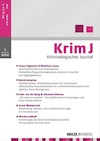 The digital transformation of police work, and with it novel analytical ambitions regarding police data, affects the ways in which police organizations produce knowledge and act upon it. Based on qualitative empirical field research in a Swiss police department, the contribution shows how traditional forms of reporting are reconfigured by new analytical use-cases for the reported data. The analysis foregrounds how frontline officers navigate novel data requirements in their everyday work practice, leading to a re-evaluation of police work between “craft” and “science.”
The digital transformation of police work, and with it novel analytical ambitions regarding police data, affects the ways in which police organizations produce knowledge and act upon it. Based on qualitative empirical field research in a Swiss police department, the contribution shows how traditional forms of reporting are reconfigured by new analytical use-cases for the reported data. The analysis foregrounds how frontline officers navigate novel data requirements in their everyday work practice, leading to a re-evaluation of police work between “craft” and “science.”
Hagmann, Jonas; Leese, Matthias (2024). Vom Sachverhalt zum Datengehalt: Polizeiliche Rapportierungspraxis zwischen Einzelfall und Aggregatebene. Kriminologisches Journal 56(3): 177-194. PDF
Mapping urban security practices
 What is a city and how do we recognize and assess security dispositives in public spaces? This chapter draws on my research program and fieldwork in Switzerland, Morocco, Nepal and Uruguay. It presents ways of systematizing urban space, and discusses how research on human, digital, physical and conceptual urban control elements can be operationalized: How can we create case studies representative of an entire city? What role do interviews play and whom should we talk to to collect data? Can we retrace practices across longer periods of time? And then – how to compare findings across radically different cities/polities? Urban security practices are extraordinarily rich, deterritorialised and interdisciplinary. A critical approach to data collection and analysis allows recognizing this – and it helps to avoid reproducing simplistic and universalizing accounts of security.
What is a city and how do we recognize and assess security dispositives in public spaces? This chapter draws on my research program and fieldwork in Switzerland, Morocco, Nepal and Uruguay. It presents ways of systematizing urban space, and discusses how research on human, digital, physical and conceptual urban control elements can be operationalized: How can we create case studies representative of an entire city? What role do interviews play and whom should we talk to to collect data? Can we retrace practices across longer periods of time? And then – how to compare findings across radically different cities/polities? Urban security practices are extraordinarily rich, deterritorialised and interdisciplinary. A critical approach to data collection and analysis allows recognizing this – and it helps to avoid reproducing simplistic and universalizing accounts of security.
Taxi-time in Montevideo: Sub-city labs, simplified research itinerary
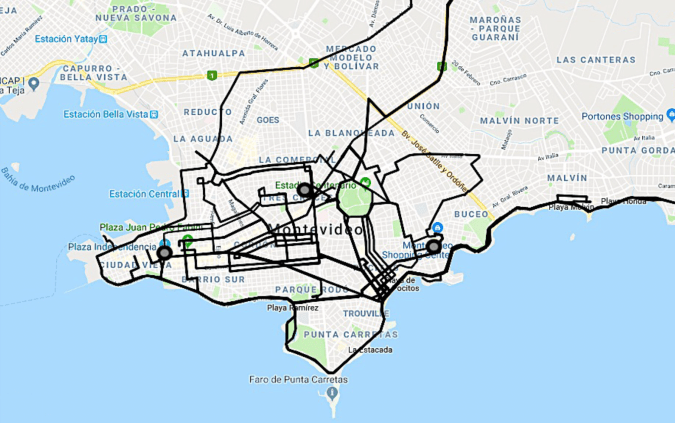
Hagmann, Jonas (2023). Mapping urban security practices. In: Salter, Mark; Mutlu, Can; Frowd, Philippe (eds.). Research Methods in Critical Security Studies, pp145-154. London: Routledge. PDF
Globalizing urban security research
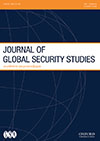 How do urban security assemblages evolve? Scholars inspired by Gilles Deleuze’s influential Control Thesis see profound shifts in the ways urban security operates. Different to Michel Foucault’s disciplinary logics, they argue, urban security assemblages now rely intimately on expanding casts of policing agents, digital surveillance and statistical knowledge(s). They reach beyond enclosures and national borders, and they challenge democratic politics ever more forcefully. Whether this general trajectory of security management holds true across the global cityscape is yet far from evident. Not only do most studies of contemporary control draw conclusions from European and North American cities exclusively. Many also reproduce and project abroad distinctively Eurocentric assumptions about state-society relations, governance and insecurity. This article in Journal of Global Security Studies first foregrounds and problematizes these penchants. It then looks at the Moroccan city of Marrakech to detail how urban security assemblages may evolve in different ways, at other speeds, and following different steering logics than what is generally set out by research on control. The article concludes with a discussion of how insights offered by places such as Marrakech contribute to more robust, analytically refined and globally inclusive research on the contemporary politics of urban security.
How do urban security assemblages evolve? Scholars inspired by Gilles Deleuze’s influential Control Thesis see profound shifts in the ways urban security operates. Different to Michel Foucault’s disciplinary logics, they argue, urban security assemblages now rely intimately on expanding casts of policing agents, digital surveillance and statistical knowledge(s). They reach beyond enclosures and national borders, and they challenge democratic politics ever more forcefully. Whether this general trajectory of security management holds true across the global cityscape is yet far from evident. Not only do most studies of contemporary control draw conclusions from European and North American cities exclusively. Many also reproduce and project abroad distinctively Eurocentric assumptions about state-society relations, governance and insecurity. This article in Journal of Global Security Studies first foregrounds and problematizes these penchants. It then looks at the Moroccan city of Marrakech to detail how urban security assemblages may evolve in different ways, at other speeds, and following different steering logics than what is generally set out by research on control. The article concludes with a discussion of how insights offered by places such as Marrakech contribute to more robust, analytically refined and globally inclusive research on the contemporary politics of urban security.
Securing Marrakech – Place Jemaa El-Fna

Hagmann, Jonas (2021). Globalizing control research: The politics of urban security in and beyond the Alaouite Kingdom of Morocco. Journal of Global Security Studies 6(4): 1-23. PDF
The politicisation of security: A new research focus on current observations
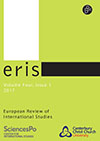 ‘Security’ has for the most part been considered a special kind of politics by observers, as one that closes down inclusive policy-making and democratic debate. This Special Issue reviews theoretical and empirical developments at the intersections of ‘security’ and ‘politics’. It argues that research centering on the notion of politicization offers new ideas on how to addresses this complex and evolving conceptual tandem, and importantly, helps elucidate the growing range of actors, arenas and arguments factually visible in contemporary security affairs. The Special Issue develops a framework around the dimensions of controversy, mobilization and arena-shifting, and showcases the potential of such a perspective through empirical illustrations and theoretical examinations, covering issues such as post-Snowden public-policy controversy in Germany, lay participation in European security strategy-making, and the evolving role of the British parliament in UK security politics. The Special Issue’s ambition is to re-engage the relationship between security and politics, to inspire innovative new empirical work on ‘politics around security’, and to empower more differentiated inquiries into the ambivalent consequences of politicization.
‘Security’ has for the most part been considered a special kind of politics by observers, as one that closes down inclusive policy-making and democratic debate. This Special Issue reviews theoretical and empirical developments at the intersections of ‘security’ and ‘politics’. It argues that research centering on the notion of politicization offers new ideas on how to addresses this complex and evolving conceptual tandem, and importantly, helps elucidate the growing range of actors, arenas and arguments factually visible in contemporary security affairs. The Special Issue develops a framework around the dimensions of controversy, mobilization and arena-shifting, and showcases the potential of such a perspective through empirical illustrations and theoretical examinations, covering issues such as post-Snowden public-policy controversy in Germany, lay participation in European security strategy-making, and the evolving role of the British parliament in UK security politics. The Special Issue’s ambition is to re-engage the relationship between security and politics, to inspire innovative new empirical work on ‘politics around security’, and to empower more differentiated inquiries into the ambivalent consequences of politicization.
Hagmann, Jonas; Hegemann, Hendrik; Neal, Andrew (2018). The politicization of security: Controversy, mobilization, arena shifting . European Review of International Studies 5(3): 3-29. PDF ToC
With contributions by Karin Aggestam, Annika Bergman Rosamond, Myriam Dunn Cavelty, Matthias Leese, Andrew Neal, Pinar Bilgin, Fiona de Londras, Eric van Rythoven, Jonas Hagmann and Hendrik Hegemann.
The Special Issue was followed up in 2020 by a Review Forum with contributions by Linda Monsees, Mike Slaven, Akos Kopper, Andras Szalai and Stefan Kroll. See European Review of International Studies 7(1): 105-122. URL
The programmatic and institutional reconfiguration of Swiss national security
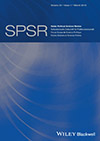
It is widely known that national security fields changed considerably in the last decades. Different from the late Cold War years, when they focused on military threats, were closely orchestrated by Defence Ministries and contained few international contacts, national security ‘systems’ today handle wide sets of dangers, draw on complex casts of actors across levels of government, and often maintain working relations with multiple foreign partners. This comprehensive reconfiguration of national security fields is a central theme to security scholars and policymakers alike – but also difficult to pin down for methodological reasons. Written documentation on security agencies does not give precise indication of actual everyday inter-agency work practices, and assessments of nationwide security work across functions and levels of government are challenging by sheer questions of size. Adopting a practice-oriented approach to security research, this article draws on an unparalleled nationwide data collection effort to differentiate and map-out the Swiss security field’s programmatic and institutional evolution.
Figure 11: Transnational inter-agency cooperation in Swiss national security 
Hagmann, Jonas; Davidshofer, Stephan; Tawfik, Amal; Wenger, Andreas; Wildi, Lisa (2018). The programmatic and institutional (re-)configuration of the Swiss national security field. Swiss Political Science Review 24(3): 215-245. PDF / Score tables / OpenAccess URL
The political construction of collective international danger
 Securitization Theory offers a powerful take on the political construction of threats. In its original variant, however, the theory focuses intimately on the deontic (norm-breaking) powers of ‘security talk’ – and not on the threat sceneries that security-speak describes. This article in the Journal of International Relations and Development addresses this latter function by reworking securitization into a positional/relational argument. Seen this way, the framing of something as threatening comes with larger – often implicit – political claims about threatening and threatened actors in world politics. The French and (West) German emirical cases illustrates this argument. They show how securitization effectively systematises international affairs, as the political identification of danger is charged with powerful ideas of who is affected by a problem, together with the own nation, and who not. Securitization seen so is a powerful ordering practices that produces turthful visions on the world, ideas of world politics that then condition foreign policy strategizing.
Securitization Theory offers a powerful take on the political construction of threats. In its original variant, however, the theory focuses intimately on the deontic (norm-breaking) powers of ‘security talk’ – and not on the threat sceneries that security-speak describes. This article in the Journal of International Relations and Development addresses this latter function by reworking securitization into a positional/relational argument. Seen this way, the framing of something as threatening comes with larger – often implicit – political claims about threatening and threatened actors in world politics. The French and (West) German emirical cases illustrates this argument. They show how securitization effectively systematises international affairs, as the political identification of danger is charged with powerful ideas of who is affected by a problem, together with the own nation, and who not. Securitization seen so is a powerful ordering practices that produces turthful visions on the world, ideas of world politics that then condition foreign policy strategizing.

Hagmann, Jonas (2018). Securitisation and the production of international order(s). Journal of International Relations and Development 21(1): 194-222. PDF
The politics and practices of securing urban spaces

According to some, societal steering evolved from an analogue disciplining of enclosures into a network-centric, privatised, digital and global form of control. This article engages this claim from an empirical security studies perspective. In the age of globalisation and urbanisation, technological innovation and liberal policy ideals, how are security apparatuses reorganised, and in what relations do they stand to local societal and political orders? The article argues that while there is an impressively rich, integrative and topical research agenda on urban security management, its empirical applications may still benefit from further development. To this aim, the article first systematises the various substantive points made by the literature. It then employs a spatial heuristic to enquire into the securing of three urban spaces – a site of mobility (HB Zürich), a public square (Bundesplatz Bern) and a place of mass commerce (St. Jakob Park Basel) – in Switzerland. Forgoing universalisms about societal steering, the article makes the case for more nuanced engagements with urban security ensembles, their technological evolution, relations with democratic ideals, globalisation and de-territorialisation both in and beyond Western polities.
Securing public space in Switzerland – Bundesplatz Bern 
Hagmann, Jonas (2017). Security in the society of control: The politics and practices of securing urban spaces. International Political Sociology 11(4): 418-438. PDF
Towards an institutional sociology of the International Relations discipline
 The sociology of International Relations (IR) literature successfully unpacks the discipline’s political and intellectual penchants. Yet curiously enough, it has not given more attention to the discipline’s embodiment in concrete institutions. How does the organization of social scientific fields, education policies, and related institutional transformations condition the production and diffusion of scholarly knowledge about world politics? This forum promotes a dedicated engagement with the ‘institutional sociology’ of the discipline. Its ambition is to highlight the diversity of sites and settings where specialized knowledge about international relations is produced, shaped and re-instantiated. In doing so, the focus on IR’s institutional layer becomes an important vector for opening up the literature to insights from related fields of study.
The sociology of International Relations (IR) literature successfully unpacks the discipline’s political and intellectual penchants. Yet curiously enough, it has not given more attention to the discipline’s embodiment in concrete institutions. How does the organization of social scientific fields, education policies, and related institutional transformations condition the production and diffusion of scholarly knowledge about world politics? This forum promotes a dedicated engagement with the ‘institutional sociology’ of the discipline. Its ambition is to highlight the diversity of sites and settings where specialized knowledge about international relations is produced, shaped and re-instantiated. In doing so, the focus on IR’s institutional layer becomes an important vector for opening up the literature to insights from related fields of study.

Grenier, Félix; Hagmann, Jonas (2016). Sites of knowledge (re-)production: Towards an institutional sociology of International Relations scholarship. International Studies Review 18(2): 333-336. PDF
With contributions by Inanna Hamati-Ataya, Thomas Biersteker, Thierry Balzacq, Jonas Hagmann, Marina Lebedeva, Jason Lane, Martin Müller and Félix Grenier.
(In)security and the production of international relations: The interlinked politics of threat construction and foreign policy-making in Europe
 What happens to foreign politics when actors, things or processes are presented as threats? This book explains state’s international behavior based on a reflexive framework of insecurity politics. It argues that governments act on knowledge of international danger available in their societies, and that such knowledge is organized by varying ideas of who threatens whom and how. The book develops this argument and illustrates it by means of various European case studies. Moving across European history and space, these show how securitization projected abroad evolving – and often contested – local ideas of the organization of international insecurity, and how such knowledges of world politics conditioned foreign policymaking on their own terms. With its focus on insecurity politics, the book provides new perspectives for the study of international security. Moving the discipline from systemic theorizing to a theory of international systematization, it shows how world politics is, in practice, often conceived in a different way than that assumed by IR theory. Depicting national insecurity as a matter of political construction, the book also raises the challenging question of whether certain projections of insecurity may be considered more warranted than others.
What happens to foreign politics when actors, things or processes are presented as threats? This book explains state’s international behavior based on a reflexive framework of insecurity politics. It argues that governments act on knowledge of international danger available in their societies, and that such knowledge is organized by varying ideas of who threatens whom and how. The book develops this argument and illustrates it by means of various European case studies. Moving across European history and space, these show how securitization projected abroad evolving – and often contested – local ideas of the organization of international insecurity, and how such knowledges of world politics conditioned foreign policymaking on their own terms. With its focus on insecurity politics, the book provides new perspectives for the study of international security. Moving the discipline from systemic theorizing to a theory of international systematization, it shows how world politics is, in practice, often conceived in a different way than that assumed by IR theory. Depicting national insecurity as a matter of political construction, the book also raises the challenging question of whether certain projections of insecurity may be considered more warranted than others.

Hagmann, Jonas (2015). (In-)security and the production of international relations: The politics of securitisation in Europe. London/New York: Routledge, 244p. URL
Engaging world politics through national lenses: IR teaching at leading American and European Political Science departments
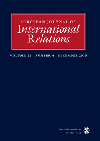 The emergent sociology of International Relations (IR) literature investigates the discipline’s organization and inner structuring. It makes the field cognizant of its own institutional and intellectual configurations and thus empowers scholars to engage more critically with IR’s analytical, geocultural, and political lenses. This contribution notwithstanding, the literature continues to focus on ‘flagship’ publications as indicators of intellectual proclivities, and on scholars as their only relevant audiences. This article challenges this focus. Making the case for an inquiry into classroom socialization, it maps the paradigmatic, geocultural, gendered, and historical perspectives taught to students in the case of 23 leading US and European IR graduate programs. It points to differences between the ‘instructed’ and the ‘published’ discipline, and shows how the former is governed and constrained by a variety of intellectual parochialisms. Problematizing the educative functions of these, the article advocates a more self-reflexive understanding of IR teaching.
The emergent sociology of International Relations (IR) literature investigates the discipline’s organization and inner structuring. It makes the field cognizant of its own institutional and intellectual configurations and thus empowers scholars to engage more critically with IR’s analytical, geocultural, and political lenses. This contribution notwithstanding, the literature continues to focus on ‘flagship’ publications as indicators of intellectual proclivities, and on scholars as their only relevant audiences. This article challenges this focus. Making the case for an inquiry into classroom socialization, it maps the paradigmatic, geocultural, gendered, and historical perspectives taught to students in the case of 23 leading US and European IR graduate programs. It points to differences between the ‘instructed’ and the ‘published’ discipline, and shows how the former is governed and constrained by a variety of intellectual parochialisms. Problematizing the educative functions of these, the article advocates a more self-reflexive understanding of IR teaching.
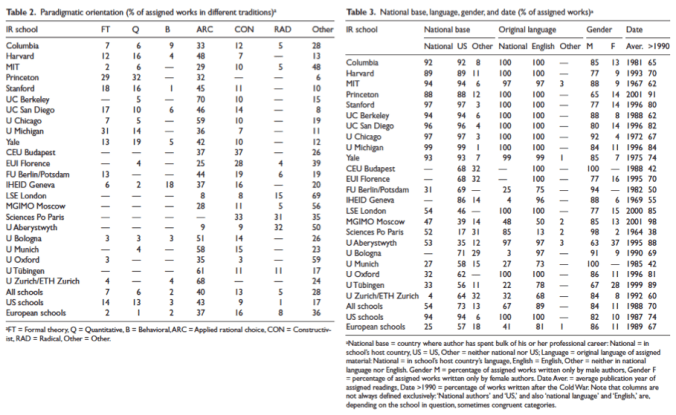
Hagmann, Jonas; Biersteker, Thomas (2014). Beyond the published discipline: Towards a critical pedagogy of international studies. European Journal of International Relations 20(2): 291-315. PDF
The causal relations at play between knowing and enacting insecurity
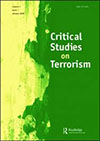
How does knowledge of insecurity connect with threat-based policy-making? Reflexive approaches to security not only maintain that dangers are socially constructed, but also that they relate with political behavior. Representations of terrorism, for instance, are argued to constitute that danger in distinct ways and thus to make certain counter-terror policies possible. This article challenges this popular perspective. It argues that constitutive argumentation advances an insufficiently tangible argument of effect, and that this conceptual weakness derives from both a problematic foundational social theory and a premature rejection of causation. Drawing on the social theory of Archer and Bhaskar, as well as a differentiated notion of causation, it advances a ‘dialectical causal’ framework for the analysis of representations of danger. Applying it to Swiss terrorism politics, the article shows how this framework improves on constitutive argumentation in disentangling the political powers involved in the production and enactment of representations of danger.

Hagmann, Jonas (2013). Representations of terrorism and the making of counterterrorism policy. Critical Studies on Terrorism 6(3): 429-446. PDF
National risk registers: The measurement, comparison and ranking of all kinds of danger
 European civil protection agencies have become highly active in measuring, comparing and ranking all kinds of public danger, ranging from natural hazards to industrial risks and political perils. This article focuses on this production of integrated ‘national risk registers’ and the analytical power politics in which they are complicit. It argues, first, that by positing ‘science’ as an objective determinant of security truth, the registers advance modernist understandings of how knowledge about danger can be arrived at – thus discounting both ‘sovereign’ and popular authorities. Second, it shows that by operationalizing traditional risk-assessment formulas, risk registers empower seemingly apolitical decisions in security affairs, taken on the basis of cost–benefit thinking. Third, it discusses how risk registers’ focus on ‘themes’ tiptoes around the definition of referent objects, thus avoiding explicit decisions about beneficiaries of particular security decisions. Taking these factors into account, the article finds the new risk registers to depoliticize national security debates – while transforming insecurity into something permanent and inevitable.
European civil protection agencies have become highly active in measuring, comparing and ranking all kinds of public danger, ranging from natural hazards to industrial risks and political perils. This article focuses on this production of integrated ‘national risk registers’ and the analytical power politics in which they are complicit. It argues, first, that by positing ‘science’ as an objective determinant of security truth, the registers advance modernist understandings of how knowledge about danger can be arrived at – thus discounting both ‘sovereign’ and popular authorities. Second, it shows that by operationalizing traditional risk-assessment formulas, risk registers empower seemingly apolitical decisions in security affairs, taken on the basis of cost–benefit thinking. Third, it discusses how risk registers’ focus on ‘themes’ tiptoes around the definition of referent objects, thus avoiding explicit decisions about beneficiaries of particular security decisions. Taking these factors into account, the article finds the new risk registers to depoliticize national security debates – while transforming insecurity into something permanent and inevitable.
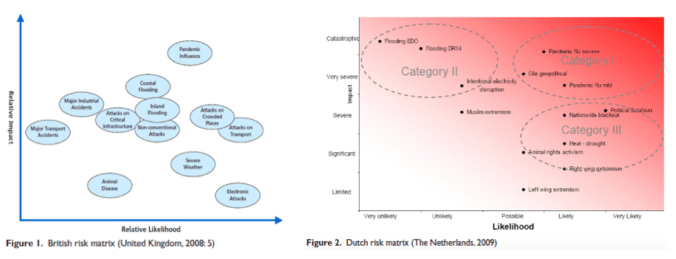
Hagmann, Jonas; Dunn Cavelty, Myriam (2012). National risk registers: Security scientism and the propagation of permanent insecurity. Security Dialogue 43(1): 79-96. PDF